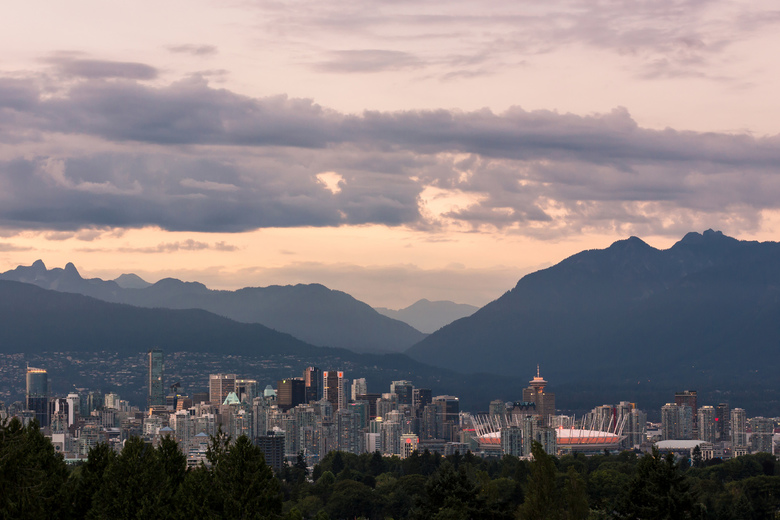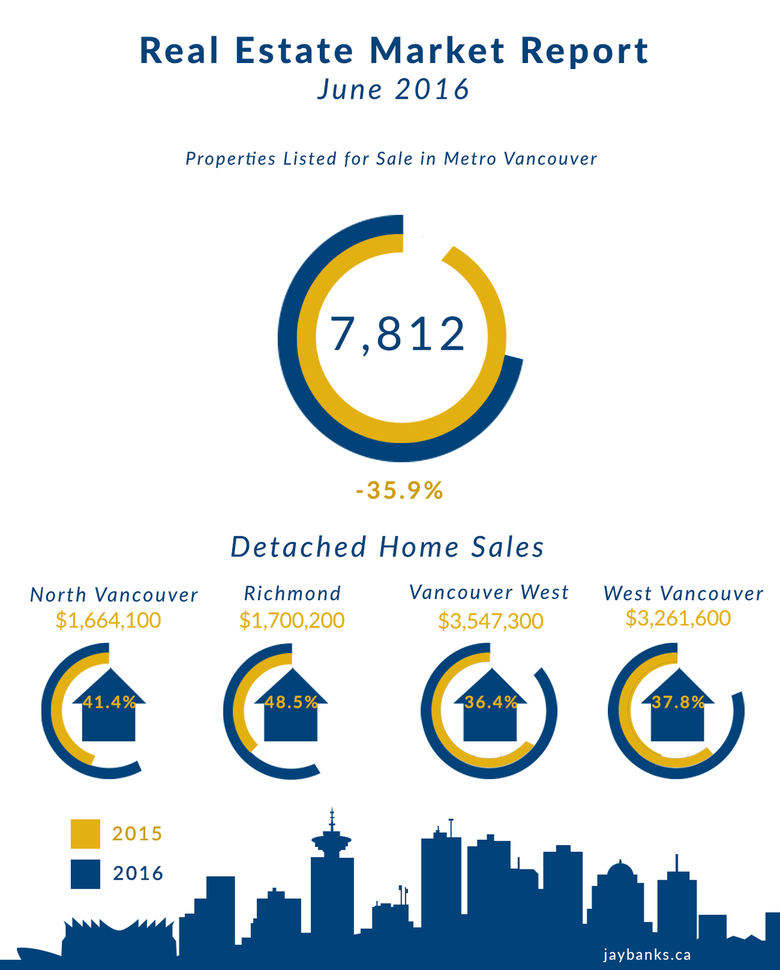The stats commentary is a little late this month mainly because there is a lot of politicking going on behind the scenes of the published data. "June was busting out all over" according to the musical Carousel and the Real Estate Board of Greater Vancouver. The June 2016 MLS Home Price Index for all residential properties in Metro Vancouver is currently at a benchmark price of $917,800, for detached properties $1.56 million. An incredible 32.1 percent increase from June 2015. The benchmark price for a detached home in the Westside of Vancouver is $3,547,000. This includes the Point Grey and Dunbar areas which are magnets for offshore investors. The benchmark detached home price in North Van is $1,664,100 an increase of 41.4% between June 2015 and 2016. In Richmond the benchmark detached price is $1,700,200 and the one year increase is 48.5%. This was the best-selling June on record.
 Vancouver by Arvin Asadi
Vancouver by Arvin Asadi
There is some suggestion that the market may have passed its peak. This could be a result of fewer foreign buyers, mortgage lending changes and exhaustion by local buyers. This has happened before especially in the summertime...there is a hiatus while the market catches its breath and then it surges forward again. Low rates and international events are conspiring to keep the Vancouver market on an upward trajectory.
What isn’t showing up in the stats is the growing anger of local residents who are now completely priced out of the city they grew up in. Up till now no level of government has paid any attention to this undercurrent of disaffection. However, the Brexit vote and the rise of Trump has signaled to all levels of government of the precariousness of their positions. The provincial government is particularly at risk in the upcoming 2017 election. They have raked in billions from the Property Transfer Tax while pooh-poohing any connection with global money pouring into the province. Under great pressure from the NDP opposition they undertook to analyze where buyers were coming from using Land Registry data and reported a 19 day period in the middle of June where they said foreign nationals (over 90% Chinese origin) purchased 5% of over 5000 sales at $5.4 billion and that really in the larger scheme of things nobody was coming from China. It was pointed out that there were many holes in the registry data and measuring a 3 week period when the inflow of capital has been increasing for three years is not particularly accurate or relevant. This same survey showed that one in seven property transfers in this period or 14.3 percent of the market for the West Richmond area were by foreign nationals (defined as not a permanent resident or a Canadian citizen).
The federal government is now showing concern about dangerous levels of debt of the Canadian consumer with rising real estate prices everywhere but Alberta and are seeking ways to cool the red hot markets in Toronto and Vancouver. It appears if they follow through on their possible choices they will kill the entire Canadian economy without touching money from outside Canada. It’s clear that the programs put into place over a 20 year period to encourage capital investment in Canada have had unintended consequences. The feds started selling citizenship for temporary loans that were far too low, starting at $450k and rising to $800k. Compared with other countries who sell their citizenship for a higher level of investment we have been giving Canada away. The big punch in the nose is from the province of Quebec. When the Harper government cancelled the Immigrant Investor program because of egregious abuse Quebec took it on. As they control their own immigration program they have continued the format of the Ottawa program. Their caveat to the thousands of wealthy Mainland Chinese pouring into Canada through Quebec is that they drop their $800k loan in Quebec and leave the province. Once an immigrant is accepted into Canada they can move anywhere in the country. According to Jason Kenney who was Minister of Immigration when the federal program was cancelled in June 2014 these new immigrants are now living at the expense of the taxpayers of Ontario and BC and adding to the stress of high real estate prices and demand in Toronto and Vancouver. There has been some pressure on the federal government to deal with Quebec over this program. Trudeau’s Minister of Immigration John McCallum has said they have no intention of raising the issue with Quebec. Too much political capital at stake for the Liberals in Quebec.
In the meantime global capital is flowing to any safe haven. Canada is perceived to have a stable government and an inclusive society so is a good place to invest. There seems to be a rising interest in commercial investments in Toronto and Vancouver. The favourable exchange rate between the Loonie and any international currency is encouraging these investments.
The problem may solve itself to some extent: China’s economy is struggling and they may be considering more control of capital leaving the country. The government allowed the Anbang Insurance Company of Beijing to invest in international hotel properties that would generate hard currency income. Anbang purchased the Waldorf Astoria Hotel in New York for almost $2 billion and has just announced it will be closing in the Spring of 2017 in order to convert the 1,400 rooms to luxury condos. There will be a small hotel component. Selling condos will allow the Anbang Insurance Company to recover its capital investment. When they bought it in 2014 they planned to renovate it under Hilton as a hotel. There was blowback from corporate and political guests about possible Chinese cyber surveillance after the proposed $100 million hotel reno.
The provincial government has tried to insulate itself from practices that have been allowed to occur in a small part of the real estate industry mainly around international clients because there was no tough enforcement or auditing mechanism approved by the provincial government in the Real Estate Services Act. The Act was administered by the government created Real Estate Council. The real estate industry has been targeted for blame in rising house prices. Governments do not want to take any responsibility for their neglect of data collection, of money laundering investigations, of capital flow restrictions, of raising the amount of capital that had to be permanently invested in job creation (as is the case in the US, another country that sells its permanent residency visas), of tax evasion, of not responding to reports of general abuse. They decided instead to blame the entire real estate industry for the problems by removing the industry self-regulation model and returning to direct government supervision. Let’s hope that they actually deal with the reported infractions.
In its ongoing desire to distance itself from public displeasure the provincial finance minister Mike de Jong has given the City of Vancouver permission to set up a system to tax owners of vacant homes. This idea was originally proposed by a group of university economists and appears to the uninitiated to be an exercise in herding cats. Garry Marr of the Financial Post suggested the fastest growing employment category in Vancouver will be that of House Sitter.
There was a federal internal document leaked to the South China Morning Post showing that the Canada Revenue Agency conducted only one successful audit in 2015 against the class of millionaire immigrants known as "astronauts": husbands who park their wives and children in expensive Vancouver homes to use all public and educational facilities, return to China to work and who pay no taxes on their world wide income. There have been reports of spouses claiming welfare tax rates as their declared income while living in their multi-million dollar home is equal to the income of a Downtown Eastside resident. CRA and the Harper government are responsible for the reduction of auditors responding to the rising complaints of criminal activity. There is now movement afoot to beef up this program and check unpaid GST and capital gains taxes, undeclared profits and income on house selling and shadow flipping. CRA says it doesn’t have the manpower or time to investigate non-payment of taxes on undeclared world wide income. They are going after the low-lying fruit.
These stats and the inflow of new residents to Metro Vancouver have placed pressure on prices in all kinds of housing and created a rental vacancy rate less than 0.5%. There is work being done to build more rental apartments but it is not even touching the demand. Anecdotally we are hearing that younger working renters want newer units with a good walk score. In Burnaby low cost rental housing is being razed to build higher and bigger upscale rental buildings. The Vancouver City Council has focused on low income rentals but the big demand is for middle class families who can find nothing to live in. As always the unsolvable dilemma for building more affordable homes and rental accommodation is the scarcity of land. The beauty of the Pacific Ocean, the mountains, the Fraser River, the protected fields of the Agricultural Land Reserve, the southern wall of the US border all conspire to keep the price of housing up and the inventory of homes for sale much lower than the demand. The dream lives on.
JB00DT

